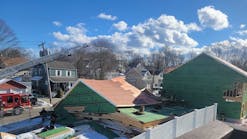BOSTON --Firefighter Kevin F. McNiff has spent 20 years on the job in busy stations in Mission Hill and South Boston. But it's the massive Oct. 1, 2002, blaze at a Southie power station that holds his body hostage.
"This is constant. I can't shake it," said McNiff, 47, who stands 6 feet 6 inches tall and comes from a family of Boston firefighters.
McNiff, a father of three, has endured surgery to clear his sinuses, and remove his tonsils and adenoids. He said he developed acid reflux, chronic headaches, shortness of breath and dizziness, and his doctors are concerned about nasal polyps turning cancerous.
"They do biopsies," said McNiff. "I have no report of that as of yet. I hope I never do."
McNiff shares a similar story with nine firefighters who were among the first responders fighting the blaze for hours in the plant as burning mineral oil rained on them and rendered their protective face masks useless.
The firefighters are suing the plant operators for negligence and infliction of emotional distress.
"Everyone was like, 'Geez do you feel lousy?' " recalled Lt. John F. McDonald, Engine 39's commander. "Sinuses were constantly running, wheezing in the chest, completely out of wind, no energy, just constantly wiped out."
McDonald, 45, said he underwent surgery in 2004 at the Massachusetts Eye and Ear Infirmary to clear his sinuses. He's also developed asthma and acid reflux that wakes him up in the middle of the night.
"When we all started having these problems and talked to people, I just said, 'Well, if anything happens to me I want to make sure my family is taken care of,' " said McDonald, a father of four. "My concern now is I don't find out I have cancer caused by this."
Attorneys for the firefighters identified the lubricating oil that coated the men as Mobil 797, a hydrotreated, heavy paraffinic petroleum distillate.
The Canadian Centre for Occupational Health and Safety says it can cause lung irritation when inhaled, and "prolonged or repeated exposure to very high concentrations of oil mists may lead to lung disease." Dr. Robert McCunney, a pulmonary physician at Massachusetts General Hospital, said mineral oil inhalation may cause pulmonary edema (fluid in the lungs), eye irritation and other troubles.
"Exposure to particulates can irritate the sinuses and irritate the upper respiratory tract, particularly if they are in an unprotected environment," said McCunney, who does not treat the firefighters.
The onset of asthma and acid reflux experienced by some of the Boston firefighters is similar to the health troubles facing some public safety personnel in the aftermath of 9/11.
"Much has been written about their injuries. We're seeing some similarities with our guys," said attorney Nina J. Pelletier, one of three lawyers representing the firefighters.
Firefighter John F. Nee, 36, has had two operations to clear his sinuses and will have a CAT scan next week for spots on his lungs.
"I never had an allergy in my life until this fire. I've had a chronic cough ever since this fire," said Nee, a firefighter for 11 years.
Former firefighter Ted O'Reilly, 69, said he must take Furosemide, a water pill, to treat his edema after doctors drained 2 1/2 pints of fluid from his lung.
McNiff said he's frustrated with plant operator Sithe Energies Inc. "They're the ones that should be answering our questions as far as my health and my future goes, my family and the other firefighters that were involved," McNiff said. "We're all seeing doctors now."
Republished with permission of The Boston Herald.





